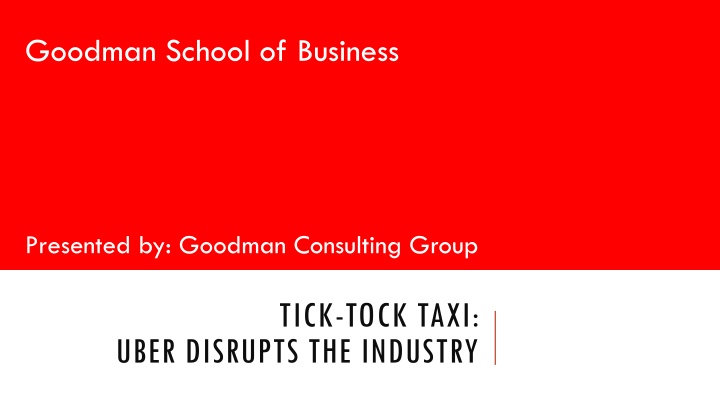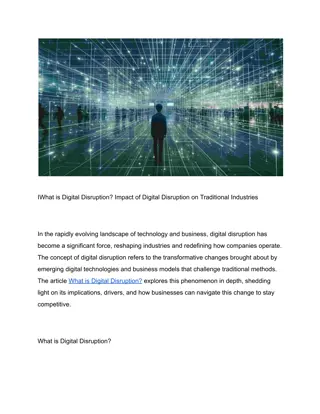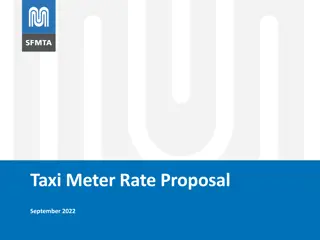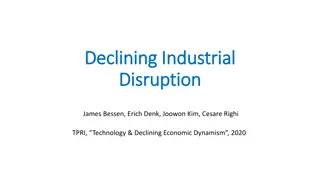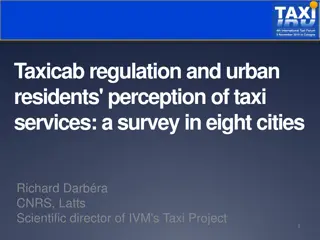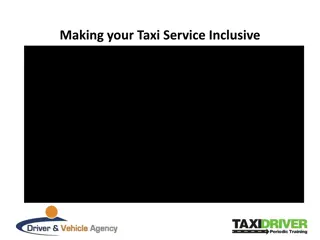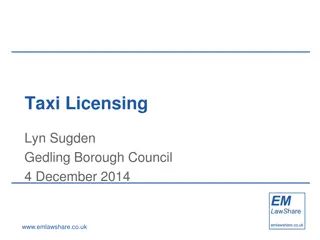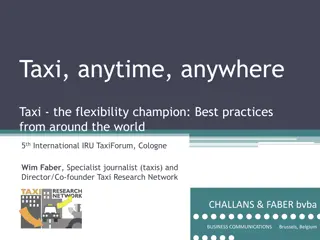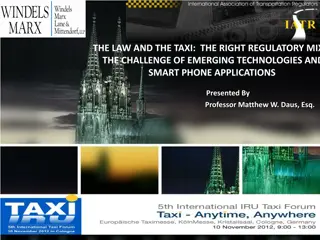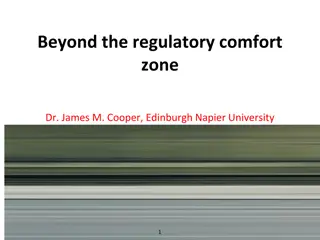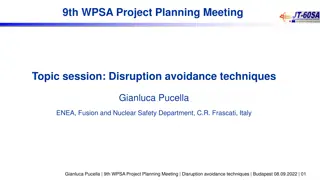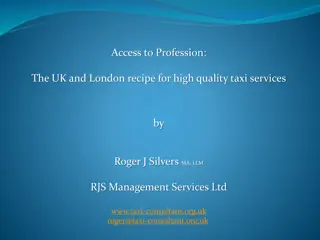Challenges and Disruption in Taxi Industry
This presentation delves into the challenges faced by the taxi industry, the disruptive impact of Uber, and recommendations to adapt. Explore the effects of Uber on traditional taxis, reactions of the industry, and a SWOT analysis to leverage core competencies.
Download Presentation

Please find below an Image/Link to download the presentation.
The content on the website is provided AS IS for your information and personal use only. It may not be sold, licensed, or shared on other websites without obtaining consent from the author.If you encounter any issues during the download, it is possible that the publisher has removed the file from their server.
You are allowed to download the files provided on this website for personal or commercial use, subject to the condition that they are used lawfully. All files are the property of their respective owners.
The content on the website is provided AS IS for your information and personal use only. It may not be sold, licensed, or shared on other websites without obtaining consent from the author.
E N D
Presentation Transcript
Goodman School of Business Presented by: Goodman Consulting Group TICK-TOCK TAXI: UBER DISRUPTS THE INDUSTRY
CHALLENGES OF THE TAXI INDUSTRY Shifts Change Safety Slow Service Pay by meter Phone calls: inconvenience Lack of transparency Getting Stranded Problem Analysis Alternatives Recommendation Risk
RATIONALE We have all had past bad experiences with taxi providers, and we feel that Uber is one of the greatest disruptors of the decade. Problem Analysis Alternatives Recommendation Risk
PROBLEM STATEMENT Uber emerges and creates a disruption for the taxi and public transportation industry Transparency Convenience Problem Analysis Alternatives Recommendation Risk
RECOMMENDATION Lower prices Use AI mechanism to predict taxi needs Disrupt the Disruptor Create regional taxi union Provide faster service Problem Analysis Alternatives Recommendation Risk
EFFECTS OF UBER ON TAXI INDUSTRY Migration of taxi drivers to Uber Changing customer behaviour Loss of market share Problem Analysis Alternatives Recommendation Risk
REACTION OF TAXI INDUSTRY TO UBER Disregard Uber Copying Uber s Platform Resistance and Regulations Taxi Industry Strikes Problem Analysis Alternatives Recommendation Risk
SWOT ANALYSIS: TAXI INDUSTRY S Safety Trained drivers Target wider population (not only tech-savvy) Privacy enabled W Higher prices Low availability High service times T More taxi drivers migrate to Uber Traditional taxis are no longer being used O Large amount of taxis are idle The taxi industry has many core competencies that they should leverage. Problem Analysis Alternatives Recommendation Risk
ALTERNATIVES Copy Uber Follow the Leader Strategy Target Non-Uber Users Disrupt the Disruptor Problem Analysis Alternatives Recommendation Risk
FOLLOW THE TREND Pros Cons Problem Analysis Alternatives Recommendation Risk
TARGET NON-UBER USERS Pros Cons Problem Analysis Alternatives Recommendation Risk
DISRUPT THE DISRUPTOR Pros Cons Problem Analysis Alternatives Recommendation Risk
EVALUATION OF ALTERNATIVES Alternative 1: Copy Uber Alternative 2: Target Non-Uber Users Alternative 3: Disrupt the Disruptor Potential Growth Ability to Disrupt Risk Management Problem Analysis Alternatives Recommendation Risk
EVALUATION OF ALTERNATIVES Alternative 1: Copy Uber Alternative 2: Target Non-Uber Users Alternative 3: Disrupt the Disruptor Potential Growth Ability to Disrupt Risk Management Problem Analysis Alternatives Recommendation Risk
RECOMMENDATION Lower prices Use AI mechanism to predict taxi needs Disrupt the Disruptor Create regional taxi union Provide faster service Problem Analysis Alternatives Recommendation Risk
RISK AND CONTINGENCY Risk Severity Mitigation Resistance to change High Create awareness plan to let drivers know why they should join the union Problem Analysis Alternatives Recommendation Risk
RECOMMENDATION Lower prices Use AI mechanism to predict taxi needs Disrupt the Disruptor Create regional taxi union Provide faster service Problem Analysis Alternatives Recommendation Risk
